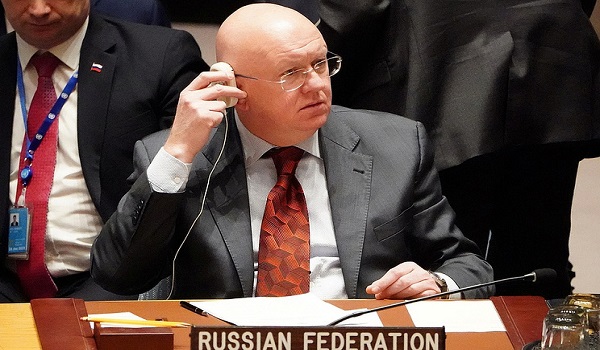UNITED NATIONS- A military scenario is inadmissible in Venezuela, Russia’s Permanent Representative to the United Nations Vassily Nebenzia said on Saturday.
“A military scenario is inadmissible,” the diplomat said answering a TASS question after the UN Security Council emergency meeting on Venezuela. “I hope everyone has enough sense to prevent a military scenario”.
He also expressed the hope that “a stance of Latin American countries will have a sobering effect on those who are puppet masters in this situation”, Tass said.
Apart from that Nebenzia pointed out that Nicolas Maduro does not need Russia’s protection as he is the constitutional president of Venezuela.
“I don’t think he needs our protection. He is the constitutional president, he has his army,” Nebenzia told reporters. “I don’t think he needs protection”.
Russia slams attempts to push Venezuelans into abyss of deadly strife
Russia firmly condemns attempts to push Venezuela into an abyss of a deadly civil war, Nebenzia said at the UN Security Council emergency meeting on Venezuela, according to Itar Tass.
“We vehemently condemn those who are pushing Venezuelan society into an abyss of a deadly strife,” he said. “The United States is depicting a picture of confrontation between ‘Maduro’s regime’ and the Venezuelans. The picture is far from being true, as Venezuela’s leader enjoys evident support among the people.”
Saturday’s meeting of the UN Security Council was “convened by the American delegation with the only goal to keep destabilizing the situation in Venezuela by imposing own attitudes and solutions to the problems it [Caracas] has faced recently,” the diplomat said.
“The meeting we all have to attend is another part of the US strategy to change power in Venezuela,” he stressed. “We regret that the Security Council is being dragged into those unscrupulous games.”
Nebenzia went on to say that Venezuela crisis might be resolved through nationwide dialogue and the lifting of discriminatory economic measures.
Urging to “refrain from discriminatory economic steps against that country,” the high-ranking diplomat recalled that “the current economic crisis has been largely triggered by steps of those states that clamor about the Venezuelans’ sufferings the most loudly.”
Apart from that, Moscow believes that “it is more important than ever to lower a degree of tough talk, to reject threats and ultimatums, to help dialogue in Venezuela start in the legal field and to help stabilize the situation,” he added.
“Foreign meddling and pitting the country’s opposition leaders” against the government should be cut short to end the crisis in Venezuela, Nebenzia is convinced.
“First, efforts should be exerted for nationwide dialogue and reconciliation to get started,” he said noting that “Venezuela’s neighbors could play a decisive role in that.”
US pressure on Venezuelan presidential candidates
 There exists proof that the United States put pressure on Venezuelan presidential candidates to undermine the elections, Russia’s Permanent Representative to the United Nations Vassily Nebenzia said on Saturday at a UN Security Council emergency meeting on Venezuela.
There exists proof that the United States put pressure on Venezuelan presidential candidates to undermine the elections, Russia’s Permanent Representative to the United Nations Vassily Nebenzia said on Saturday at a UN Security Council emergency meeting on Venezuela.
“On May 20, 2018, the Venezuelans again supported Nicolas Maduro as president with nearly 68% of the vote,” the Russian ambassador said. “Foreseeing such a scenario, Washington did its best to undermine the vote in advance, casting a shadow on the country’s renewed governmental agencies.”
“In particular, there is enough evidence that some opposition candidates experienced extremely tough pressure so that they would drop their presidential bids and quit the presidential race,” Nebenzia said.
Venezuela crisis
On January 23, Venezuelan parliament speaker and opposition leader Juan Guaido declared himself interim president at a rally in the country’s capital of Caracas. Venezuelan President Nicolas Maduro, in turn, blasted the move as a coup staged by Washington and said he was severing diplomatic ties with the US.
Several countries, including the Lima Group (excluding Mexico), the United States, Albania, Georgia, Switzerland and the Organization of American States, have recognized him.
Russia, Bolivia, Iran, Cuba, Syria, Nicaragua, Salvador and Turkey voiced support for Maduro, while China and Belarus called for resolving all differences peacefully and warned against foreign interference. The United Nations secretary general, in turn, called for dialogue to resolve the crisis.
H.M

